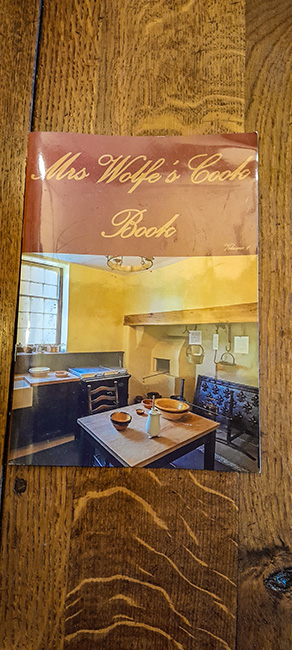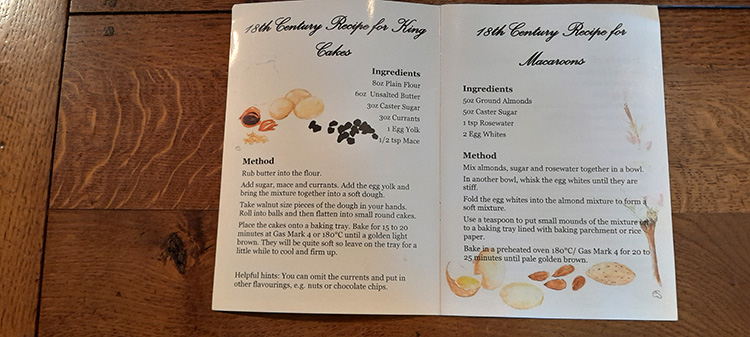Mrs Wolfe’s Cookery Book
General James Wolfe (1727-1759) was a British military hero of the highest order. Born into a military family, he was commissioned 2nd lieutenant in the Marines at the age of fourteen. Two years later he saw action against the French at the Battle of Dettingen, one of many clashes during the War of Austrian Succession. Wolfe subsequently served in Flanders and then Scotland during the Jacobite Rebellion. It is, however, with the Seven Years (or French and Indian) War in North America that his name will forever be associated. First at the Siege of Louisburg, then as the ‘Hero of Quebec’, following his daring defeat of Montcalm at the Plains of Abraham. This was a victory that ended French territorial ambitions in North America, facilitated the end of the Seven Years War, and opened the doors for Britain’s further global expansion. For Wolfe, however, it was the end of the road. Fatally wounded in the battle, his body was repatriated and interred at St Alfege Church in Greenwich.
 Wolfe was born in the vicarage at Westerham in Kent, the elder of the two sons of Colonel (later Lieutenant-General) Edward Wolfe and his wife Henrietta. He spent his early years in the same town at a house called Spiers. At the end of the 19th century the house was being used as a school but in 1913 the Canadian businessman and philanthropist Joseph Learmont purchased it with the intention of making it a museum. Joseph died in 1918, before this plan could be carried out. Five years later his widow, Charlotte donated Spiers to Britain’s National Trust with an endowment of $20,000 for maintenance and a further $30,000 for the purchase of 18th century furnishings, paintings and artefacts, many of which were connected to Wolfe’s life.
Wolfe was born in the vicarage at Westerham in Kent, the elder of the two sons of Colonel (later Lieutenant-General) Edward Wolfe and his wife Henrietta. He spent his early years in the same town at a house called Spiers. At the end of the 19th century the house was being used as a school but in 1913 the Canadian businessman and philanthropist Joseph Learmont purchased it with the intention of making it a museum. Joseph died in 1918, before this plan could be carried out. Five years later his widow, Charlotte donated Spiers to Britain’s National Trust with an endowment of $20,000 for maintenance and a further $30,000 for the purchase of 18th century furnishings, paintings and artefacts, many of which were connected to Wolfe’s life.
Now called Quebec House, the property continues to be administered and cared for by the National Trust (http://www.nationaltrust.org.uk/quebec-house). It is open to the public, albeit rather infrequently during the winter months, and is well worth visiting. During a recent visit a volunteer cook was at work in the kitchen preparing delicious rosewater macaroons. The recipe came from Mrs Wolfe’s Cookbook (volume 1), which was available for purchase. This slim publication, comprising a mere six pages, contains two ‘18th century’ recipes and four of Mrs Wolfe’s. All the dishes are sweet, rather than savoury, even the pickled lemons and the potato pudding. All in all, Mrs Wolfe’s Cookbook, in reality barely a leaflet, seemed rather limited. With no introduction or commentary, it fails even to point out that Mrs Wolfe was not James’s wife, but his mother, Henrietta. James, though romantically involved with several women and engaged at the time of his death to Katherine Lowther (later the Duchess of Bolton) never married.
Henrietta Wolfe (c1703-1764), in common with many women of her time, maintained a family recipe (or receipt) book which was the source of the entries in the National Trust leaflet. The volume is on display not at Quebec House, but in the Wolfe Room at Squerryes Court, a late 17th century manor house located near Westerham. Squerryes is now owned, as it has been since the 1730s, by the Warde family. George Warde was a boyhood friend of James Wolfe and Henrietta left him her recipe book on her death. In 1980 the Warde family privately published extracts from the book in a 25 page pamphlet. It includes fish, meat, dessert and fruit recipes. These range from boiled carp and fricasseed Turbot to stewed pigeons and mutton ‘cabobs’ (kebabs). Preserved fruits, lemon pudding and orange cream also feature. Some are rather sketchy in terms of cooking methods and quantity of ingredients. Mrs Wolfe also provided details for the preparation of home medicines. One, Extract of Cow Dung, was a nostrum deemed efficacious for ailments as diverse as scurvy and gout. Another, a treatment for consumption, contained numerous ingredients but chiefly snails and earthworms. How did James Wolfe make it to adulthood?
Squerryes House and Estate (https://www.squerryes.co.uk/) now operates as a family business. It comprises a vineyard, wine shop, restaurant and cafeteria. It also offers venues for weddings and other events. Whether any of Mrs Wolfe’s recipes feature on any of the restaurant or café menus is doubtful. For home bakers the author recommends the 18th century macaroon recipe. With only four ingredients it is simple to make, a sure fire teatime hit and a great option for junior cooks.
https://www.nationaltrustcollections.org.uk/place/quebec-house.


